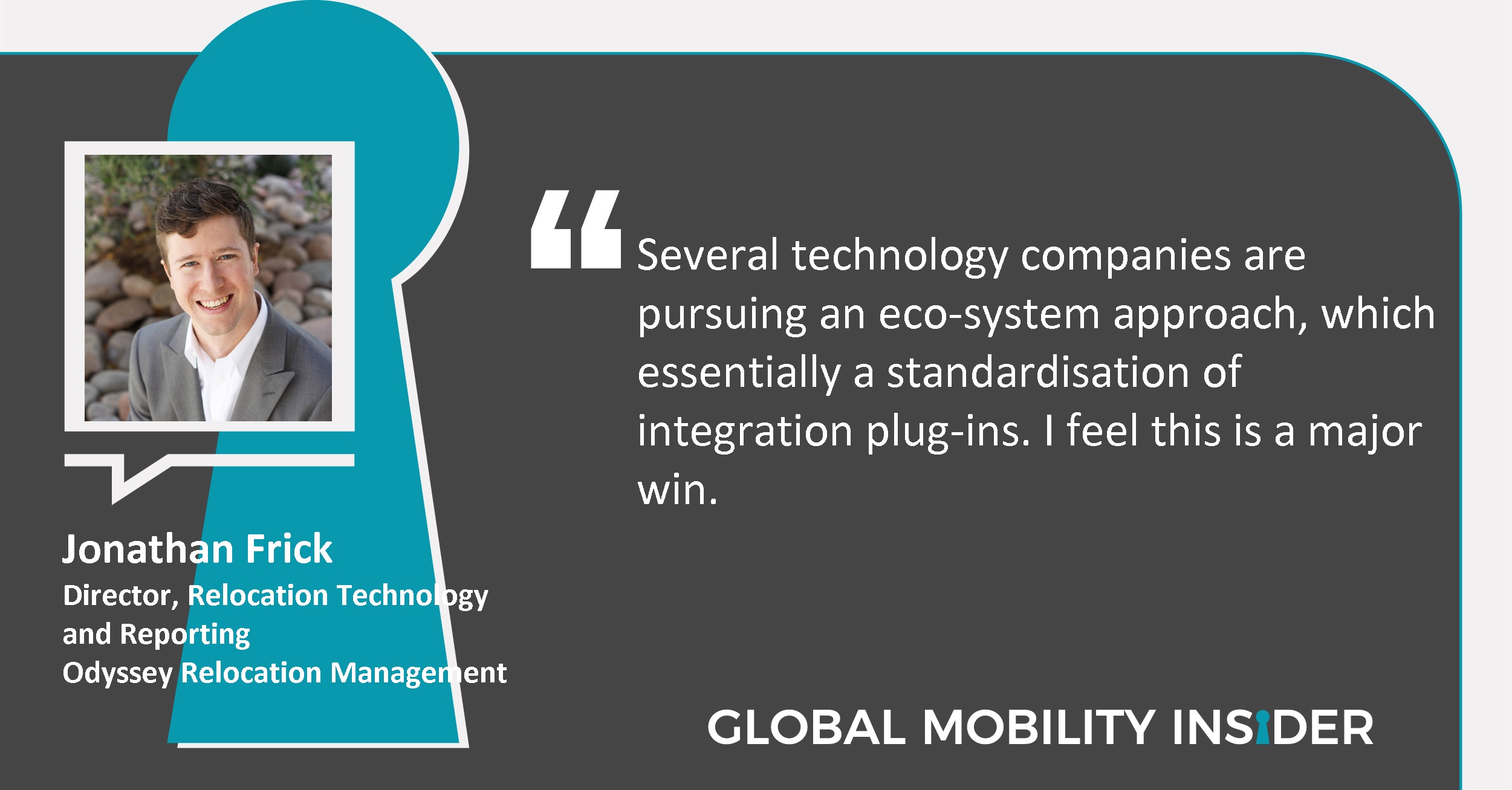Jonathan Frick - Director, Relocation Technology and Reporting - Odyssey Relocation Management
Name: Jonathan Frick
Position: Director, Relocation Technology and Reporting
Company: Odyssey Relocation Management

Professional Background
Odyssey Relocation Management, Director, Relocation Technology and Reporting (United States): 2019 – Present
Ineo, Manager, Global Mobility (United States): 2017 – 2019
Aires, Team Lead, International Compensation (United States): 2016 – 2017
Aires, Associate Team Lead, International Compensation (United States): 2016 – 2016
Aires, Senior International Compensation Analyst (United States): 2015 – 2015
Aires, International Compensation Analyst (United States): 2012 – 2014
Aires, EMAC (United States): 2011 – 2012
Career Insider
Q: Why global mobility, and how did you get started in the industry?
A: Honestly, I did not plan to go into Global Mobility. Like many, I fell into it. In college, I didn’t know that the industry existed. My full exposure to global mobility was a quarter page in my International Business textbook with 3 definitions: expatriate, inpatriate, and repatriate. So, coming out of college, I had aspirations to be a financial advisor, having passed my series 7. I quickly realised that my list of contacts, who were my college friends, couldn’t care less about IRAs and life insurance. It was 2011 and the market still hadn’t recovered from the 2008 crash. Jobs were hard to come by and I spent 7 months job searching. In the meantime, I worked the night shift at a Hampton Inn where I sent out applications at night, interviewed during the day, and slept sometime in between. Eventually, I applied for a general accounting job that was not right for me, but the talent acquisition manager was working on hiring a consultant for Aires, a relocation management company. She referred me and, after several interviews, I was hired as an expense coordinator. The rest is history.
Click & Like on LinkedIn
Q: What advice would you give to someone looking to build a career in global mobility?
A: Global mobility is a very diverse industry. I would suggest that, once you get into the industry, spend as much time and energy as necessary to get to thoroughly know every aspect of the industry, from HHG, to real estate, to global compensation, to language and cultural training. Inside a corporate environment, global mobility touches payroll, legal, talent acquisition, talent management, high potential programs, training, development, finance, etc. It is one of the few functions that is pervasive in a corporate environment and provides insight into nearly every corner of a business. Often the first role you have may not be the best one for you. Learning about how diverse and how many different types of people it takes to successfully move someone across the world provides an opportunity to see roles and responsibilities that could lead to your perfect role. And, if it turns out you are already in the perfect position, nothing helps you be better at your role than a thorough cross-training, allowing you to seamlessly interact with a large field of players.
Q: What aspect of your work at Odyssey do you find most exciting?
A: My previous roles were pretty black and white. Don’t get me wrong, you can be very creative to increase efficiencies and make the expense and comp functions of a mobility department as seamless as possible. However, technology does not have a box that you have to work within. And the ways you can make a difference are only as limited as your creativity, time availability, and budget restraints. This role requires me to learn each and every role, put myself in the shoes of the consultants, expense specialists, real estate specialists, HHG specialists, transferee, and corporate mobility in order to propose solutions that are beneficial to all. The challenge of taking the big picture into consideration is something I really enjoy. At the end of the day, being able to point to the tangible value you have added to the company and the transferee experience is very rewarding.
Industry Insider
Q: What aspect of global mobility is likely to keep you up at night?
A: Nationalism. I’m all for identifying and supporting the nation you are from and supporting its interests. When nationalism in its extreme version becomes a detriment to other nations, global mobility suffers. This mindset is what leads to stricter regulation, whether it be visa and immigration, tax regulation, customs and border patrol, and tariffs. Increased regulation and tariffs lead to higher costs in the best-case scenario and making human capital mobility nearly impossible in the worst-case scenario.
Q: What is the most important strategic tip you can give to companies handling global mobility?
A: You can’t know everything. Your program is only going to be as strong as the subject matter experts that you surround yourself with. So, surround yourself with people who are passionate about their piece of the puzzle and get satisfaction from completing their job well.
Q: What kind of tech or software would you suggest for global mobility processing?
A: There are several great options for managing a global population: Ineo’s TechSuite, Equus AssignmentPro, Topia, Orion, as well as very specialised mobility solutions such as Monaeo’s travel tracker, ReloQuest’s temporary living platform, and SixWallz and Living Abroad destination services. And I know there are many, many more products that are really good solutions. The product that I would suggest depends significantly on the program and the culture of the company. And the answer changes on a daily basis as new technologies come up. Blockchain and AI are two hot topics that technology companies are working to leverage into the global mobility solutions as we speak, and who knows what the new technology they will come up within the next year. Regardless of the technology platform, there a few pieces of advice that I have.
First, never replace the human element with technology. Over and over it is shown that moving is one of the most stressful experiences a person goes through. The human involvement is pivotal to grounding the employee and showing that the company cares about them. Second, make sure your platform can integrate via APIs or other integrations. Nothing kills productivity and distracts from taking care of the employee more than duplicating data entry. Integrations are easy to complete and can go from all your corporate structures (payroll, HRIS, etc) to the technology platform, making it so you can manage the outcome of the move instead of entering the data over and over again. And third, the technology platform needs to remove as much distraction from the employee as possible. The employee is moving to do a job, and any time that the move distracts becomes an inefficiency in the relocation. This looks different based on the employee. For example, some employees would prefer to fill out a printed-out document as opposed to learn the new technology for submitting expenses. If your population is not tech-savvy, the technology platform needs to enable easy completion and submission of the document to minimise unnecessary distraction. This can be counter-intuitive as we are always focused on new technology that makes it easier for the transferee. Sometimes the newer, more efficient technology can be less efficient.
Visionary Insider
Q: How can global mobility professionals ensure that they are handling issues of diversity and inclusion appropriately?
A: The visibility that a mobility professional in a corporation has to company practices around diversity and inclusion is very unique. With the mobility department’s interactions with talent acquisition, training and development, and compensation and benefits, the mobility professional has a seat at the table where exclusion and uniformity is often built into processes and procedures. The voice they have is unparalleled to ensure that that the process is fair, equitable, and aimed at supporting the groups often marginalised in the corporate world. From a service provider standpoint, the empathy needed to support a family in transition can only come from a diverse and inclusive workforce. A company made up of like-minded, similar experienced individuals will fail because they will not be able to handle the diverse make up of the population being sent around the world for their company. The best practice to create the strongest workforce would be one that aims to collect unique experiences, backgrounds, ethnicities, etc. so you can provide the best service interactions with their clients and the employees of their clients.
Q: How can global mobility practices get better in the next 5 years?
A: Three thoughts here. First, country regulation is becoming more and more complicated. This is leading to longer time from initiation to move as well as increased costs for service provider as well as governmental fees. I think that service provider and internal mobility departments would do well to work more with the local government to support mobility friendly regulation. It would be win-win, allowing the best people to sit in the best seat by pulling from the larger talent pool of the world instead of just the local talent pool. Second, there are two many technology platforms out there resulting in inefficient data management and mis-matched data sets. The industry should move towards more wholistic integrations across the various technology solutions that are being utilised. This will increase the speed of business and lead to a better experience for all stakeholders. Finally, the service providers of the industry have a tendency to operate in silos, which is a disservice to the end consumer of their product. Further collaboration could lead to significant breakthroughs that could revolutionise the industry. As is, the service providers are just chasing the same goal without duplicitously and inefficiently instead of developing new and better service offerings.
Q: What are the major developments you currently see happening in the industry, and how do you feel about them?
A: Several technology companies are pursuing an eco-system approach, which essentially a standardisation of integration plug-ins. This can lead to the sharing of data in real time between the various technologies being utilised across the service providers. That can lead to a very powerful tool where each member of the team operates in their own system, but the data is shared universally and instantly, producing efficiencies and minimising the administration that ultimately occurs with the segmentation of the databases. I feel this is a major win; however, it is also a powerful tool for whichever company achieves this.
Another major development is insertion of start-up technology companies that are disrupting business as usual. An example is Open Door. Historically, the home sale process can be long and emotional as there are showings, offers, negotiations, fall throughs, and so. However, with Open Door there are no showings. There is a single offer and a guaranteed close. There are cons, as the offer is less than what the person would get in a free market, but it could be worth it in that circumstance. Companies like this can be seen as a threat to the realtors and the RMCs who primarily rely on real estate referrals for their revenue. My thought process is that it provides a valuable solution to the clients and their employees who need to move fast. It challenges the rest of the service providers to up their game and provide the added value that makes the people moving choose you as opposed to those companies.
Either/Or…
- Short-term or long-term assignment? Long-term
- Airbnb or serviced apartments? Serviced Apartments
- Excel or global mobility software? Global mobility software (although I am a huge fan of Excel)
- Lump-sum or flex-ben? Flex ben
- Facebook or LinkedIn? LinkedIn
- Outlook or Gmail? Outlook
- Taxi or Uber? Uber
- iOS or Android? iOS
- Mac or PC? PC
- Computer or tablet? Tablet
- Work hard or play hard? First one, then the other


Leave a Comment
* Fields marked with this asterisk are mandatory.